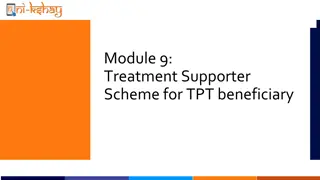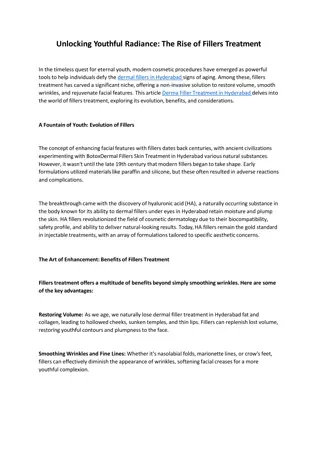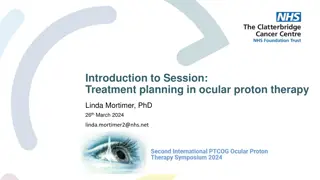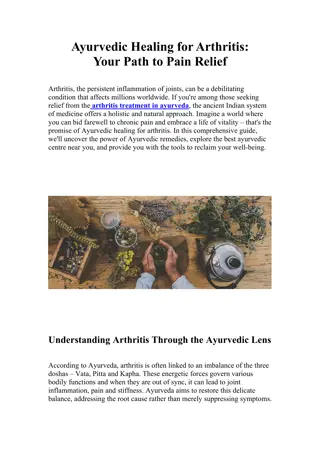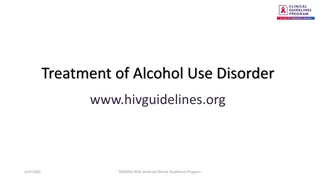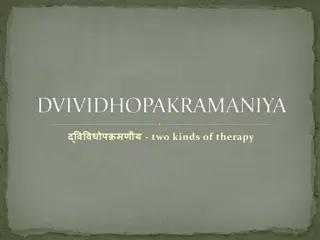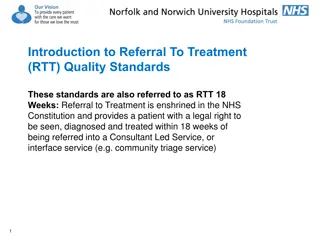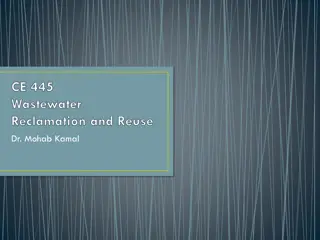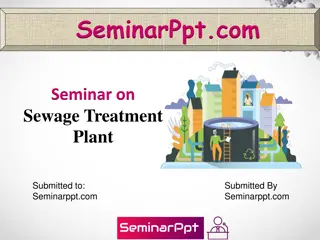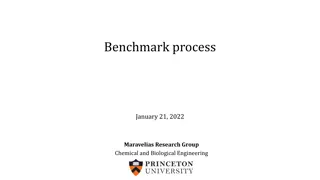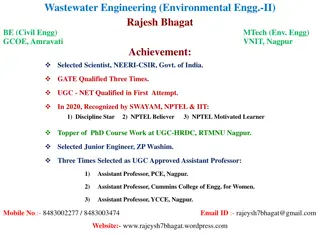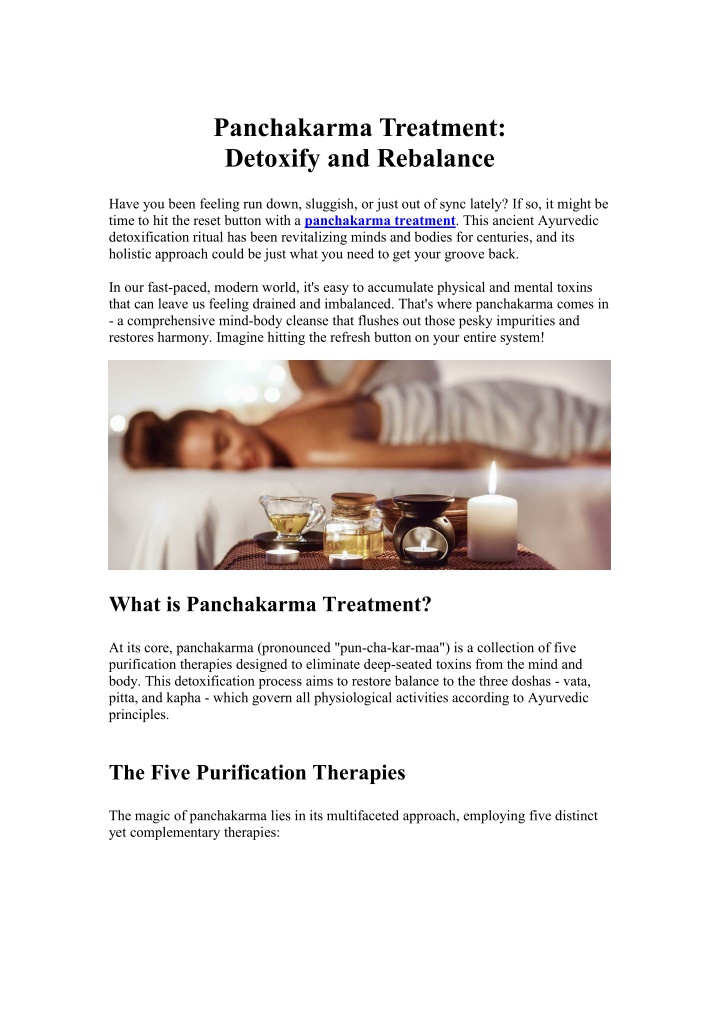
Panchakarma Treatment Detoxify and Rebalance
This article introduces Panchakarma, an ancient Ayurvedic detox ritual for cleansing and rebalancing the body. It suggests considering Panchakarma treatment if feeling worn out or out of sync. The process involves five therapies, including vomiting, purgation, and enemas, to eliminate toxins and restore harmony. Preparing with dietary changes and lifestyle adjustments is recommended. Treatments like oil massages and herbal steams are administered over days to weeks. Post-treatment, easing into a balanced routine is advised. Benefits include improved digestion, boosted immunity, mental clarity.
Download Presentation

Please find below an Image/Link to download the presentation.
The content on the website is provided AS IS for your information and personal use only. It may not be sold, licensed, or shared on other websites without obtaining consent from the author. If you encounter any issues during the download, it is possible that the publisher has removed the file from their server.
You are allowed to download the files provided on this website for personal or commercial use, subject to the condition that they are used lawfully. All files are the property of their respective owners.
The content on the website is provided AS IS for your information and personal use only. It may not be sold, licensed, or shared on other websites without obtaining consent from the author.
E N D
Presentation Transcript
Panchakarma Treatment: Detoxify and Rebalance Have you been feeling run down, sluggish, or just out of sync lately? If so, it might be time to hit the reset button with a panchakarma treatment. This ancient Ayurvedic detoxification ritual has been revitalizing minds and bodies for centuries, and its holistic approach could be just what you need to get your groove back. In our fast-paced, modern world, it's easy to accumulate physical and mental toxins that can leave us feeling drained and imbalanced. That's where panchakarma comes in - a comprehensive mind-body cleanse that flushes out those pesky impurities and restores harmony. Imagine hitting the refresh button on your entire system! What is Panchakarma Treatment? At its core, panchakarma (pronounced "pun-cha-kar-maa") is a collection of five purification therapies designed to eliminate deep-seated toxins from the mind and body. This detoxification process aims to restore balance to the three doshas - vata, pitta, and kapha - which govern all physiological activities according to Ayurvedic principles. The Five Purification Therapies The magic of panchakarma lies in its multifaceted approach, employing five distinct yet complementary therapies:
Vamana (Therapeutic Vomiting) This controlled purging technique helps eliminate toxins from the respiratory and digestive systems. Virechana (Purgation Therapy) Virechana uses therapeutic laxatives to flush out toxins from the gastrointestinal tract and bloodstream. Basti (Enema Therapy) This ancient form of enema helps cleanse the colon and optimize nutrient absorption. Nasya (Nasal Administration) By administering herbal oils and powders through the nose, nasya clears toxins from the head and sinus region. Raktamokshana (Blood Detoxification) As the name suggests, this therapy purifies the blood through methods like bloodletting or leeching. Pre-Panchakarma: Prepping Mind & Body Before embarking on the panchakarma journey, it's crucial to prepare both mind and body. This preparatory phase, known as purvakarma, may involve dietary changes, herbal supplements, and lifestyle adjustments to prime your system for the upcoming cleanse. The Panchakarma Process The panchakarma process itself is a multi-day (often multi-week) affair, with each day bringing a new combination of therapies tailored to your specific needs. Expect a variety of treatments like oil massages, herbal steams, and medicated enemas, all administered by skilled Ayurvedic practitioners.
Post-Panchakarma: Aftercare & Integration Once the intensive cleanse is complete, the post-panchakarma phase focuses on slowly reintroducing a balanced diet, supplements, and lifestyle practices to help integrate and sustain the benefits of the treatment. Think of it as gently easing back into your routine, but with a renewed sense of vitality. Benefits of Panchakarma Beyond the obvious perk of flushing out accumulated toxins, panchakarma offers a host of potential benefits, including: - Improved digestion and metabolism - Boosted immune function - Enhanced mental clarity and focus - Reduced stress and anxiety - Increased energy levels - Relief from chronic conditions like arthritis, skin issues, and more
Who Can Benefit from Panchakarma? While panchakarma can benefit virtually anyone seeking a full-body reset, it's particularly useful for those dealing with chronic health issues, high-stress lifestyles, or a general feeling of being out of balance. However, certain conditions may preclude specific therapies, so it's essential to consult with a qualified practitioner. Finding a Qualified Practitioner Speaking of practitioners, it's crucial to entrust your panchakarma journey to experienced, well-trained professionals. Look for Ayurvedic clinics or centers with a solid reputation, and don't hesitate to ask about the practitioners' qualifications and experience. Panchakarma vs. Other Detox Methods Unlike many modern detox fads that rely on restrictive diets or extreme fasting, panchakarma takes a gentler, more holistic approach. Rather than shocking the system, it gradually and systematically eliminates toxins while nourishing the body with herbal treatments and personalized dietary recommendations. The Panchakarma Experience Admittedly, the prospect of voluntary vomiting or enemas might seem a bit daunting at first. But those who have experienced panchakarma often liken it to hitting the reset button on their entire being. Imagine emerging from this ancient ritual feeling lighter, brighter, and more in tune with yourself like shedding layers of accumulated grime to reveal your true, radiant essence. Conclusion In our relentless pursuit of health and wellbeing, panchakarma offers a time-honored solution for detoxifying the mind, body, and spirit. By embracing this comprehensive cleanse, you're not just purging physical toxins but also creating space for renewed vitality, balance, and inner harmony. So why not take that first step toward rejuvenation and find a 'panchakarma treatment near me' today?
Frequently Asked Questions (FAQs) Q1: Is panchakarma safe for everyone? While panchakarma is generally considered safe when performed by qualified practitioners, certain conditions or medications may contraindicate specific therapies. It's essential to disclose your full medical history and consult with an experienced Ayurvedic doctor before proceeding. Q2: How often should I undergo panchakarma? The recommended frequency of panchakarma treatments varies based on individual needs and circumstances. Most practitioners suggest undergoing a full panchakarma cleanse annually or bi-annually, with shorter treatments (like basti or nasya) incorporated more frequently as needed. Q3: Can I continue my regular activities during panchakarma? During the intensive cleanse phase of panchakarma, it's advisable to minimize physical and mental exertion to allow your body to fully focus on the detoxification process. However, light activities like gentle yoga or meditation may be recommended. Q4: How long does the entire panchakarma process take? The duration of a complete panchakarma treatment can range from a few days to several weeks, depending on the specific therapies involved and the severity of your imbalances. Your Ayurvedic practitioner will develop a customized plan based on your individual needs.


